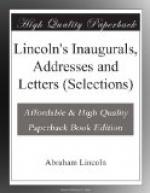In 1803, the Federal Government purchased the Louisiana country. Our former territorial acquisitions came from certain of our own States; but this Louisiana country was acquired from a foreign nation. In 1804, Congress gave a territorial organization to that part of it which now constitutes the State of Louisiana. New Orleans, lying within that part, was an old and comparatively large city. There were other considerable towns and settlements, and slavery was extensively and thoroughly intermingled with the people. Congress did not, in the Territorial Act, prohibit slavery; but they did interfere with it—take control of it—in a more marked and extensive way than they did in the case of Mississippi. The substance of the provision therein made in relation to slaves was:
First. That no slave should be imported into the Territory from foreign parts.
Second. That no slave should be carried into it who had been imported into the United States since the first day of May, 1798.
Third. That no slave should be carried into it, except by the owner, and for his own use as a settler; the penalty in all the cases being a fine upon the violator of the law, and freedom to the slave.
This act also was passed without ayes and nays. In the Congress which passed it there were two of the “thirty-nine.” They were Abraham Baldwin and Jonathan Dayton. As stated in the case of Mississippi, it is probable they both voted for it. They would not have allowed it to pass without recording their opposition to it if, in their understanding, it violated either the line properly dividing local from Federal authority, or any provision of the Constitution.
In 1819-20 came and passed the Missouri question. Many votes were taken, by yeas and nays, in both branches of Congress, upon the various phases of the general question. Two of the “thirty-nine”—Rufus King and Charles Pinckney—were members of that Congress. Mr. King steadily voted for slavery prohibition and against all compromises, while Mr. Pinckney as steadily voted against slavery prohibition and against all compromises. By this, Mr. King showed that, in his understanding, no line dividing local from Federal authority, nor anything in the Constitution, was violated by Congress prohibiting slavery in Federal territory; while Mr. Pinckney, by his votes, showed that, in his understanding, there was some sufficient reason for opposing such prohibition in that case.
The cases I have mentioned are the only acts of the “thirty-nine,” or of any of them, upon the direct issue, which I have been able to discover.
To enumerate the persons who thus acted as being four in 1784, three in 1787, seventeen in 1789, three in 1798, two in 1804, and two in 1819-20, there would be thirty of them. But this would be counting John Langdon, Roger Sherman, William Few, Rufus King, and George Read each twice, and Abraham Baldwin three times. The true number of those of the “thirty-nine” whom I have shown to have acted upon the question which, by the text, they understood better than we, is twenty-three, leaving sixteen not shown to have acted upon it in any way.




